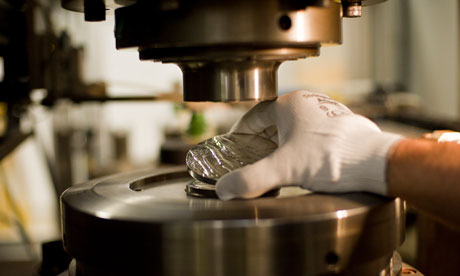London 2012 Olympics: give these Welsh workers a medal
The precious metals have been mined in Utah and Mongolia and turned into chunky discs in Spain and Birmingham. But it is in a secure factory at the foot of the Rhondda valley in south Wales that these "blanks" are being transformed into 4,700 glittering Olympic and Paralympic medals.
On Tuesday the doors of the Royal Mint in Llantrisant were – cautiously – opened and workers paused from their striking, soldering, burnishing, engraving and ribboning to speak of their pride at undertaking such a task and the pressure of producing the perfect medal. Kevin Jones in the "medal cell" strikes the design on to the Paralympic gongs using a hydraulic press that exerts up to 850 tonnes on to the blanks. "It's not a job to be rushed," says Jones, "We want these to be just so. I can't wait to see the games and think that I might have made that medal hanging around someone's neck."
For the record, the gold medals are not solid gold. They comprise 92.5% silver, a little copper and 6% gold. The silver medals contain 92.5% silver and 7.5% copper. The bronze are 97% copper with a little zinc and (Cornish) tin.
The mining company Rio Tinto has provided more than eight tonnes of gold, silver and copper for the medals. It has been criticised by environmentalists concerned about air pollution produced by its mines and by unions who claim ill-treatment of some miners. Rio Tinto says being "ethically responsible" runs through everything it does.
Already, the Olympic medals have been completed and are being guarded in the mint, which has been in south Wales since 1967. The Paralympic ones will be finished soon.
Tucked away in the medal office (only 25 people have the pass to get into this area), Sian Merry sits at a sewing machine attaching the ribbons to a batch of silver medals. She always wears finger protectors, not to prevent injury but so that she does not touch the medals. Anyone who does handle the medals wears protectors or gloves so the athlete is the first person to lay a finger on it. Trying a medal on is strictly forbidden. Merry likes to watch the swimming and proudly revealed that she won an admittedly more modest diving medal when she was a pupil at Brynnau primary school down the road. "It's a pressured job but it's a privilege being part of a team that produces something so beautiful," she says.
On Tuesday the doors of the Royal Mint in Llantrisant were – cautiously – opened and workers paused from their striking, soldering, burnishing, engraving and ribboning to speak of their pride at undertaking such a task and the pressure of producing the perfect medal. Kevin Jones in the "medal cell" strikes the design on to the Paralympic gongs using a hydraulic press that exerts up to 850 tonnes on to the blanks. "It's not a job to be rushed," says Jones, "We want these to be just so. I can't wait to see the games and think that I might have made that medal hanging around someone's neck."
For the record, the gold medals are not solid gold. They comprise 92.5% silver, a little copper and 6% gold. The silver medals contain 92.5% silver and 7.5% copper. The bronze are 97% copper with a little zinc and (Cornish) tin.
The mining company Rio Tinto has provided more than eight tonnes of gold, silver and copper for the medals. It has been criticised by environmentalists concerned about air pollution produced by its mines and by unions who claim ill-treatment of some miners. Rio Tinto says being "ethically responsible" runs through everything it does.
Already, the Olympic medals have been completed and are being guarded in the mint, which has been in south Wales since 1967. The Paralympic ones will be finished soon.
Tucked away in the medal office (only 25 people have the pass to get into this area), Sian Merry sits at a sewing machine attaching the ribbons to a batch of silver medals. She always wears finger protectors, not to prevent injury but so that she does not touch the medals. Anyone who does handle the medals wears protectors or gloves so the athlete is the first person to lay a finger on it. Trying a medal on is strictly forbidden. Merry likes to watch the swimming and proudly revealed that she won an admittedly more modest diving medal when she was a pupil at Brynnau primary school down the road. "It's a pressured job but it's a privilege being part of a team that produces something so beautiful," she says.

Comments
Post a Comment